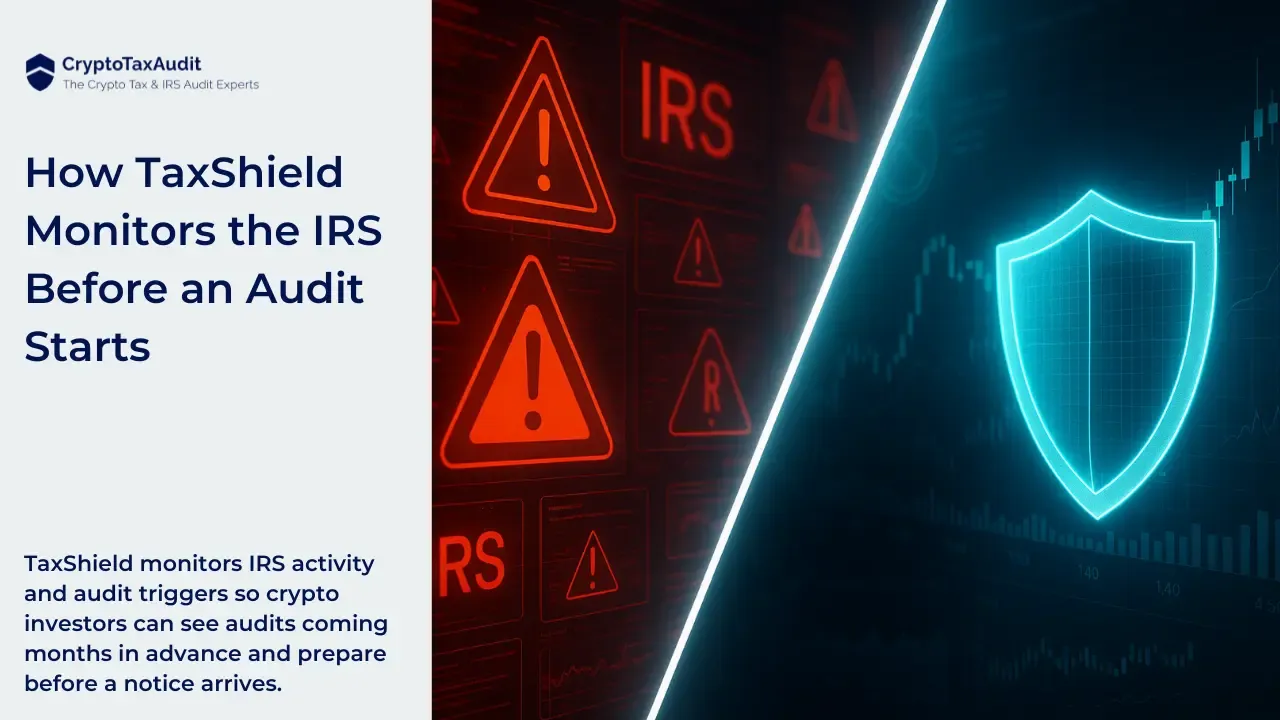
What are the odds that you will get audited by the IRS? And what can you do to reduce the risk? (G-1)
What’s your risk?
What are the odds that you’ll be audited by the IRS? Let’s start with some facts.
Who gets audited?
Back in 1963, nearly 6% of all U.S. taxpayers had their tax returns audited. It seemed that everybody knew someone who had been audited. The figure is lower today, but there’s more to the whole story. People with incomes over $500,000 are selected for audits up to 10 times more frequently. If you trade or invest in cryptocurrencies, that number is even higher.
The IRS gets $80 billion.
The IRS Commissioner claimed in April 2021 that there were over $1 trillion in unreported taxes due, a number that he blamed in large part on crypto traders. With that statement, the IRS effectively vilified all crypto traders. Why would the commissioner do that? It’s simple. He wanted more money from Congress, and he succeeded.
In August 2022, Congress awarded the IRS $80 billion in new funding over the next 10 years with the authorization to hire 87,000 new agents. That funding roughly doubled its operating budget and more than doubled the number of agents. What’s more, Congress stipulated that $46 billion be used for enforcement involving digital assets monitoring and compliance, including the IRS agents that carry badges and guns.
The new funding will also modernize IRS technology infrastructure, making it easier to track, analyze, and profile U.S. taxpayers. With all these changes, the number of audits, especially crypto tax audits, a increase substantially.
With these dramatic upgrades to the IRS, how can you reduce your risk of an IRS audit, especially if you hold cryptocurrencies?
Total positive income.
Of all the audit avoidance strategies that exist, the most important thing you can do is to account for all of your Total Positive Income, or TPI, in your tax return.
What is TPI? Simply put, TPI is your income without expenses. Yet TPI also includes trading proceeds, including crypto gains from trades, swaps, and sales.
Crypto exchanges have begun reporting your activity to the IRS over recent years. These reports, however, don’t necessarily account for your expenses, so each time you trade, swap, or sell cryptos, the IRS considers that a proceed. And proceeds contribute to TPI. For frequent traders, the Total Positive Income including trading proceeds can be extremely large.
For example, let’s say you buy $10,000 worth of bitcoin. A week later you sell the bitcoin to buy another crypto that’s worth $10,001. That’s a $1 gain, yet the proceeds are $10,001. If you do one trade a week for one year, gaining $1 each time, you’ll have proceeds of $521,326. That’s the TPI, and that’s what crypto exchanges report to the IRS. Yet, during that same year, the value of your crypto is only worth $10,052 since your expenses are not included in your TPI.
How do they know?
The IRS knows about your TPI. They get information from the various forms that get filed and submitted to the IRS by employers, brokerages, crypto exchanges, and other companies. These are typically disclosed using forms W-2, 1099, and K-1.
The IRS has also gone to court to get customer records from U.S. crypto exchanges that didn’t comply voluntarily. If you bought cryptos at a U.S. exchange, it’s likely that they know about you too. The data they have maps crypto wallet addresses to your KYC information, so they know who owns which wallets. And with the transparency of the blockchain, the distributed public ledger of all crypto transactions, the IRS can easily track the movement of your cryptos.
Your TPI audit risk.
The growing risk for crypto traders isn’t just conjecture. Recent IRS statistics show very high audit rates for TPI above $500,000. As the simple example above shows, a trader with cryptos that may only be worth about $10,000 could trigger a $500,000 or greater TPI level.
Here’s actual data from 2019 showing the risk of getting audited by the IRS based on TPI. Based on this data, we added the audit risk projection a 6-year period. As you’ll see, the chance of being selected for an IRS audit over the next six years ranges from 4% to over 50% at the highest TPI levels.

Remember, TPI is not how much you keep, it’s your income plus your proceeds without regards to your costs and expenses. So, your risk level may be higher than you thought.
These fresh audit rates reflect the IRS’ commitment to Congress to dramatically ramp up audits on the wealthy. It’s also easier for the IRS to shakedown crypto traders than the ultra-rich who can use a phalanx of lawyers to befuddle the IRS accountants.
Six-year audits.
Normally, the IRS gets only 3 years to audit you after filing your return. They get 6 years if they can show you underreported your income by at least 25%. Because of the high TPI numbers for crypto traders, the 6-year window is very easy for the IRS to hit.
If your return is considered fraudulent, then there’s no time limit. And, the criminal prosecution threshold is quite low.
Did you answer NO to the virtual currency question on your tax return? Did you report only some of your crypto income? Did you choose not to report any of your crypto trades? If so, then you have no protection, and the IRS has no statute of limitation.
What can you do?
When it comes to TPI, be sure to account for all of it. In fact, if you report more TPI on your tax return than the IRS was expecting, that’s good. The IRS shouldn’t bother you with an audit based on underreporting.
Note that Total Positive Income has a major impact on your likelihood for an IRS audit, yet there are also other ways to reduce your risk, techniques that we share regularly with our clients.
Defend yourself today.
Regardless of your reporting strategy, nothing completely protects you from an IRS audit. The exact method for determining who is selected for an IRS audit is a closely guarded secret. So, you need proper defense.
Founded in 2015, CryptoTaxAudit defends crypto traders and investors during IRS crypto tax audits, appeals, and when necessary, in tax court. The company has an experienced team of crypto tax experts including CPAs, enrolled agents, forensic accountants, and gain calculation staff.
CryptoTaxAudit protects its clients with Tax Shield, its flagship membership service. It was created in response to the growing cost of defense against the virtually unlimited IRS enforcement budget, where crypto audit defense can cost taxpayers from $50,000 to $100,000 or more, due to the complex nature of crypto tax returns and the IRS’ tenacious focus on crypto owners.
The IRS has their team of crypto tax experts. Shouldn't you? Become an IRS Guard Dog member today and gain peace of mind, available at CryptoTaxAudit.
DISCLAIMER: Opinions and perspectives of the author, host, and guests. It should not be construed as U.S. taxpayer advice. There are often multiple interpretations of tax law. Various strategies may be suited to specific individuals and for particular situations. Seek out professional tax, legal, or financial advice from CryptoTaxAudit or from other reputable companies.





